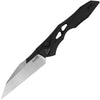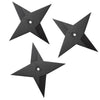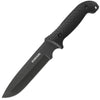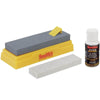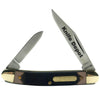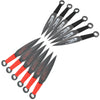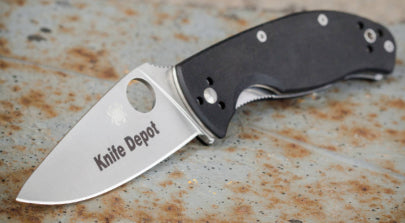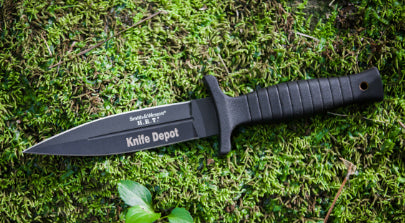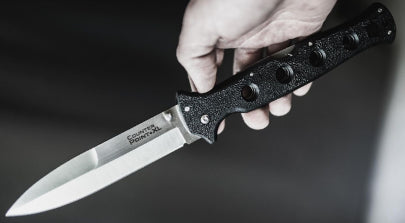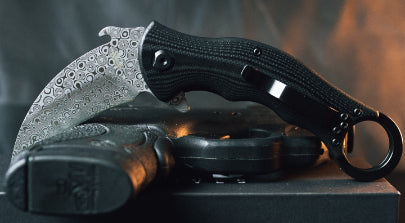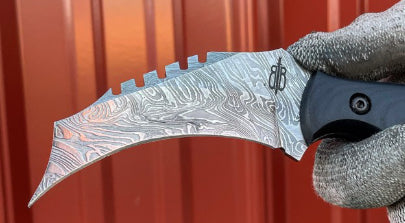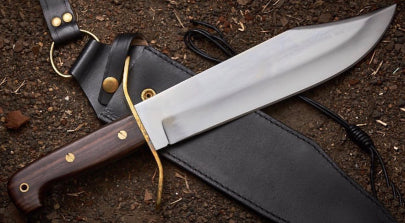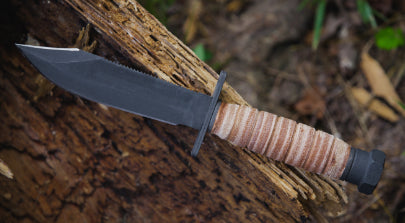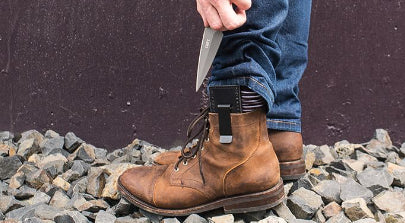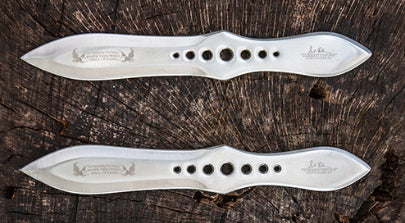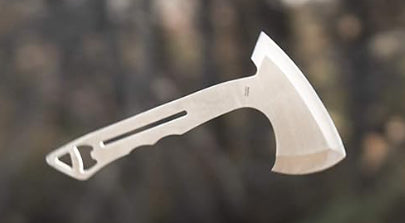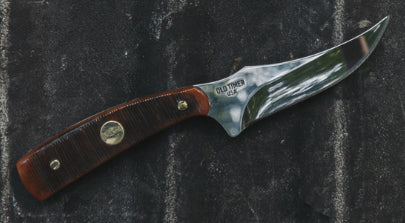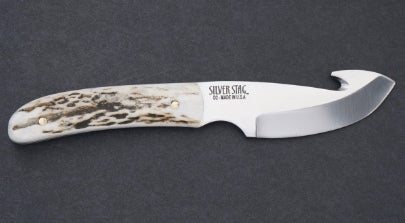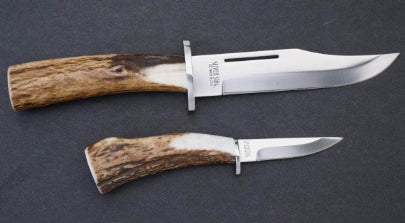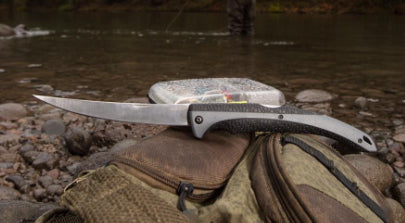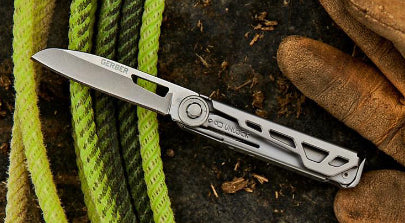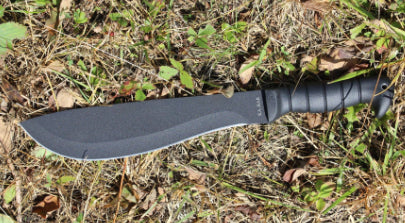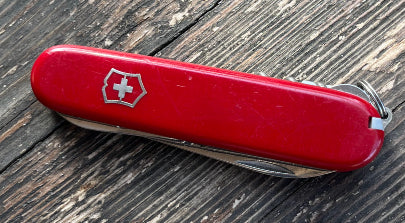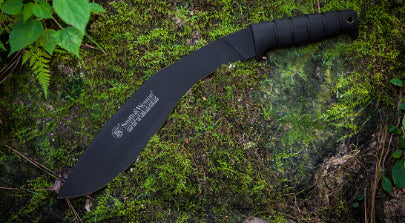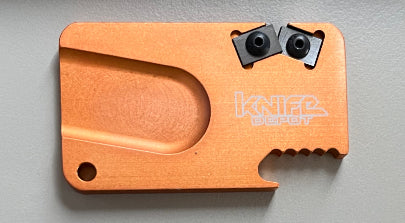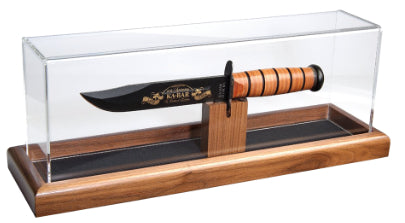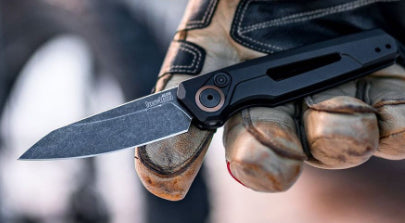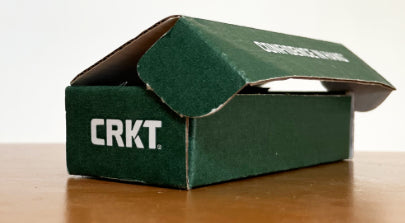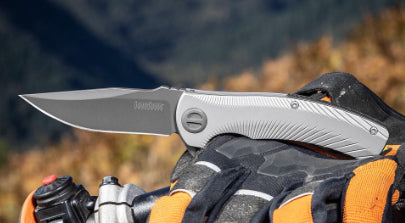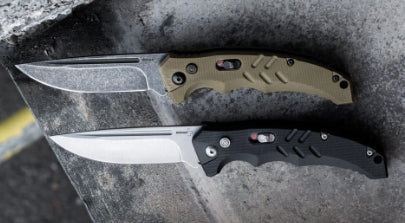Knife Care and Maintenance
- To keep your knife in the best possible working condition, follow the points outlined below.
- To take excellent care of your kitchen knives, follow the points outlined below.
- To take excellent care of your knife collection, follow the points outlined below.
- To clean or not to clean your vintage knives, read and then decide by the last item below:
Knife Care and Maintenance
Keep the blades dry and wipe fingerprints and moisture off, after use, with a soft all cotton cloth or chamois. This is particularly important with blades of high carbon steel. Tarnishing is a normal property of carbon steel and cannot be avoided. Applying a couple of drops of any quality oil or silicon treatment to the blade with a soft all cotton cloth will provide excellent protection. A good wax is also excellent protection. Check your knives often for possible trouble spots. If any stains appear, try removing the stain with a standard metal cleaner or polish. Blades of most stainless steels used in knives are not rustproof but are rust or stain resistance. So therefore stainless steel blades should still be kept clean and wiped dry after use, especially many of the new high carbon stainless steels like ATS-34, and CMP-T440V.
Folding knives require special care
- When not in use, store knives and leather sheaths separately because leather does absorb moisture and can rust your blade. Tanning salts and acids present in the leather can rust or tarnish steel. Keep leather sheaths limber with leather preservative or mink oil.
- Pocket knives require special care. Keep the locking device on folding models clean and free of debris. An occasional drop of light oil at each joint will assure smooth blade action in opening and closing. Each blade should click open smoothly and snap shut. This opening and closing is what the old timers called "Walks and Talks" well.
- Keep knives sharp. A sharp knife is safer to use. A sharp knife requires minimal effort to cut and therefore has less a chance of slipping. The secret of proper sharpening is to do it regularly. Use a knife sharpener, sharpening steel, or other mechanism frequently. If you have difficulty maintaining an edge on knives, have them professionally sharpened.
- Never sharpen blades on a power-driven grinding wheel, which can burn the temper from the blade. This is the type of high-speed grinder found in many home shops.
- Remember that knives are cutting tools and blades are very sharp. Therefore, please exercise caution when handling your knife. And, never use your knife as chisel, pry bar, screwdriver or hammer. If your knife is a good one then a chisel, pry bar, screwdriver or hammer will cost less than a knife replacement anyway. Do not pound on the back (spine) of the blade. Keep sharp knives well away from the reach of young children.
- Always cut with the edge moving away from you. Knives can have sharp razor edges so handle all knives with care and respect. Do not use for throwing unless specifically produced for that purpose (except for throwing knives).
- If you carry a pocket knife in your pocket with coins or keys you will scratch the handle and bolsters. The same is true if you put all your knives in a cardboard box stacked one atop the other, they will all get scratched, which reduces their value.
Moisture and fingerprints on knives are the prime villains to avoid!
Kitchen Knife Care
Good kitchen knives can be a major investment, but if properly cared for they can last a lifetime. Cleaning knives after each use will keep them in the best condition and promote food safety. Mild soapy water cleans without damaging and washing by hand only takes a minute and really takes care of your knives. Never use a dishwasher for cleaning your good knives (kitchen or other wise). Doing so could possibly remove the temper from the edge and render the blade soft so it will not hold an edge. When cleaning your kitchen knives make sure that the blades dont touch or bump other objects. The water jets in the dishwasher can knock your knives into other hard objects. Remember that the precision ground cutting edge may be damaged if it strikes other cutlery, pots or pans.
Always use an appropriate cutting board
- Always use an appropriate cutting board in the kitchen to get the most out of the sharpness of your knives. Use an cutting board material easy to clean and that is soft. We recommend natural wood or synthetic chopping boards like soft polyethylene. Never use glass, ceramic, metal, marble or any other hard surface as a cutting board as this can have an damaging effect on your knives. When chopping foods that have a tough or waxy exterior (such as bell peppers), chop with the waxy side down, as the more tender inside flesh is easier on knife blades.
- Knives require a safe dry storage place, and a knife block is perfect for storing knives. Knife blocks will prevent injury and protect the blade from being damaged.
- Cross-contamination is a major food-safety concern. Bacteria transferred from knives and work surfaces, such as cutting boards, to other foods can lead to food poisoning. Mild soapy water cleans and sanitizes if you wash your hands, the cutting board and the knife. We advocate thorough and consistent cleaning for knife care and food-safety!
The storage room for your kitchen knives should be low in humidity and cool.
Knife Collection Care
Remember to take excellent care of your knife collection, as you are the curator during your lifetime for future generations to enjoy. Moisture and fingerprints are the prime villains to avoid. Check your knife collection periodically and keep your knives in a dry location. A good rule to follow is to make sure the room that you store your knives in is comfortable for you to stay in, then it is more likely to be a good storage place for your knives. The storage room should be low in humidity and cool. Avoid areas with a high relative humidity or a great shift in temperatures. (Relative humidity can be high in attics and basements, especially if they are unheated or uninsulated. Moisture from condensation can come into contact with your knives if they are stored in such areas.) If you live where it is humid use silica gel or other desiccants (a drying agent) to help keep your knives dry by placing them in a strong plastic bag that has no holes and can be closed tight. Use desiccants for short-term storage only. Make an asserted effort to wipe your knives at least once a month. Your collection can lose value very quickly if you allow your knives to deteriorate from lack of care and maintenance.
To clean or not to clean your vintage knives
First, a word of caution: If you think your knife has significant value, consult a professional. Many valuable objects (knives included) are damaged each year by people using the wrong preservation or cleaning techniques. If you are going to clean your own knives, practice on common knives until you get the hang of things.
Article by Copyright © Byron Rogers, visit http://KnifeWebGuide.com for more original content like this. Reprint permission granted with this footer included.











